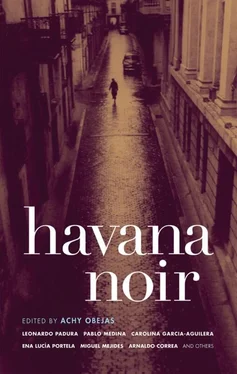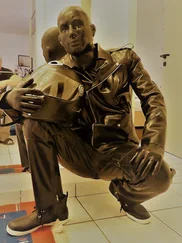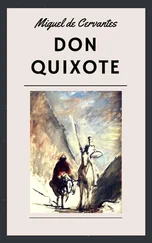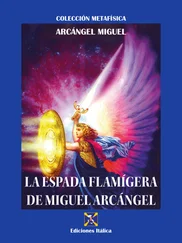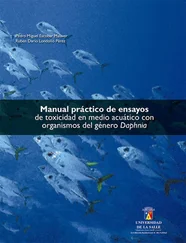Miguel Mejides - Havana Noir
Здесь есть возможность читать онлайн «Miguel Mejides - Havana Noir» весь текст электронной книги совершенно бесплатно (целиком полную версию без сокращений). В некоторых случаях можно слушать аудио, скачать через торрент в формате fb2 и присутствует краткое содержание. Город: New York, Год выпуска: 2007, ISBN: 2007, Издательство: Akashic Books, Жанр: Детектив, на английском языке. Описание произведения, (предисловие) а так же отзывы посетителей доступны на портале библиотеки ЛибКат.
- Название:Havana Noir
- Автор:
- Издательство:Akashic Books
- Жанр:
- Год:2007
- Город:New York
- ISBN:978-1-933354-38-5
- Рейтинг книги:4 / 5. Голосов: 1
-
Избранное:Добавить в избранное
- Отзывы:
-
Ваша оценка:
- 80
- 1
- 2
- 3
- 4
- 5
Havana Noir: краткое содержание, описание и аннотация
Предлагаем к чтению аннотацию, описание, краткое содержание или предисловие (зависит от того, что написал сам автор книги «Havana Noir»). Если вы не нашли необходимую информацию о книге — напишите в комментариях, мы постараемся отыскать её.
, authors uncover crimes of violence and loveless sex, of mental cruelty and greed, of self-preservation and collective hysteria, in a city characterized by ironic and wrenching contradictions.
Havana Noir — читать онлайн бесплатно полную книгу (весь текст) целиком
Ниже представлен текст книги, разбитый по страницам. Система сохранения места последней прочитанной страницы, позволяет с удобством читать онлайн бесплатно книгу «Havana Noir», без необходимости каждый раз заново искать на чём Вы остановились. Поставьте закладку, и сможете в любой момент перейти на страницу, на которой закончили чтение.
Интервал:
Закладка:
“Give it to me, papi.”
Johnny dropped the hammer he was holding against a metal bucket and made a loud noise.
Obdulio woke with a start. “Qué pasó?” he said, sitting up and looking through the rear window.
“Nada. Go back to sleep,” Johnny answered, and kept on working until his eyes closed involuntarily and he dreamed of Miami Beach nightclubs and gorgeous tanned women with large, shapely breasts.
Johnny, it must be said, had a wife, but she was one of those women who consider sex an unpleasant marital duty to be performed twice monthly without abandon or fanfare, like getting an injection. In the three years they had been married, Johnny’s wife had grown dull and morose, feeling betrayed that Johnny had not made good on his promise to get her pregnant. She was subject to fits of resentment that took the form of burning Johnny’s coffee so that it became undrinkable, or salting his food to such a degree that he had to spit it out. When she finally went to live with her sister in Cotorro, Johnny was overjoyed. In fact, he celebrated that night by drinking a bottle of rum and running the Russian motor until it whined and rattled like it wanted to die.
“A Mayami me voy, a Mayami me voy,” Johnny chanted, dancing round Obdulio, who hooted and leaped like an African warrior about to wrestle a lion.
In six months the Ana María was finished and it was such an exemplary visage of a seagoing vessel that Johnny entertained the thought of selling her for a thousand dollars and staying in Havana until the son of a bitch Fidel died. With a thousand dollars he could fix up his uncle’s Chrysler. With a thousand dollars he could approach that girl with the long legs and jet-black hair who lived on the corner of Manrique and Lagunas streets and call up to her, “Come on, sugar, let’s take a drive around the city.” With a thousand dollars he’d be a big man in this godforsaken city.
But those thoughts stayed with him only two nights. By God , he said to himself on the third night, I’ll make it to La
Yuma or die . With a renewed sense of purpose he went off to Jaimanitas, a little fishing village in the outskirts of Havana, to observe what time the patrullas passed by; he did so for two weeks, hiding behind a stand of sea grape, swatting at mosquitoes, and recording the times in an old notebook.
Rather than tell his mother directly, he decided he would leave a letter for her stating that he was sorry but he had no option and reassuring her that he would send for her as soon as he was settled. She still loved El Comandante as she had loved Johnny’s father, who abused her and disappeared for weeks at a time, showing up to take her money and beat her up again. “Fidel is the most wonderful man in the world,” she would say, raising her eyes to the ceiling as people sometimes do when contemplating Jesus. After reading the letter, his mother would cry for a day, then go downstairs to gossip with the neighborhood ladies and forget about her son. At least this is what he told himself.
In preparation for the voyage he had been gathering provisions any way he could, buying some, borrowing others, and, when he had no choice, stealing the rest. In the forward compartment of the Ana María he stored ten liters of water, several bags of stale bread, a block of farmer’s cheese, and seven cans of Russian meat. Carefully balanced along the sides of the boat he placed a flashlight (stolen), two oars he had borrowed from his uncle, a fishing line with several hooks and sinkers that Obdulio’s father had given them, a knife that had seen better days (taken from his mother’s kitchen), a compass and an ancient sextant, both stolen from the Naval Museum in La Cabaña, and sixty liters of gasoline that had cost him several hundred dollars. Also on the boat, well hidden from view for now, was a small American flag he hoped to wave once he got within view of La Yuma. In a frivolous moment he decided to take the leather backseat of the Chrysler, cracked and brittle with age, and glue it down on the deck of the boat with marine epoxy so that Obdulio could sleep comfortably on the way across.
At midnight of the appointed day, Johnny and Obdulio waited for Obdulio’s father, Manolo, to arrive with the garbage truck he had commandeered to transport the Ana María to the little cove in Jaimanitas. At 12:30 Johnny grew worried; at 1 o’clock he was desperate. At 1:15 Obdulio’s father finally showed up, not in the twenty-five-footer with a canvas cover he had promised, but in a small Moscovitch pickup with a sixfoot bed. Johnn y’s heart sank to a level it had never known before. He sat on the front fender of the Chrysler and felt tears welling in his eyes, but he contained them.
“Manolo,” Johnny said to Obdulio’s father, “how are we going to load a fifteen-foot boat on that cockroach?”
“Don’t worry, asere,” Obdulio’s father said. “We’ll do it. I brought enough rope so we can tie it securely on top. No problem.”
Obdulio’s father was determined to have his son in the United States so he could send remittances home.
“What are people going to think when they see a Moscovitch with a boat twice its size tied on top?”
“Nothing, asere,” said Manolo. “Because there isn’t anybody out at this time of night. You think this is Nueva York?”
“I thought you were going to bring a big truck,” Johnny said.
“Asere, what happened is somebody else took it for the night. But don’t worry so much. This is going to work, you’ll see.”
It took the three of them an hour to load and tie the Ana María onto the Moscovitch. Johnny thought for sure the shock absorbers would give way but he was wrong. The pickup merely lurched and groaned and finally settled nicely six inches from the ground. The Ana María lay upside down, its prow extending six feet beyond the cab and blocking all but a six-inch band of windshield. Manolo reassured Johnny that he could drive the streets of Havana with his eyes closed. Given that the government shut down the city’s electric power at night, that was pretty much what they’d have to do: drive in the dark with the headlights turned off.
“One pothole and there goes the front axle,” Johnny said.
Manolo once again tried to calm him, then reached under the driver’s seat and pulled out a bottle of chispa de tren that he passed to Johnny. Johnny took a swig and gave it back to Manolo.
“That’s for the trip,” Manolo said, pushing the bottle away. “Make sure you make an offering to Yemayá before you push off.”
They drove in silence and darkness without hitting a single pothole and reached the turnoff at 2:45 a.m., with plenty of time to ship out by 3:27, when Johnny had determined no patrullas passed by. As Manolo negotiated the sandy road that led to the cove, the Moscovitch waddled and almost tipped over a couple of times, then hit a rut where the wheels spun themselves into the sand and lost traction.
Manolo smacked the steering wheel with the palm of his hand. Johnny cursed God and all the angels, and both left the cab simultaneously, walking around the truck to gauge how deeply the tires were embedded in the sand. Manolo dug around the two front tires while Johnny stood by the passenger door and looked at Obdulio, who was sleeping soundly inside. What he wouldn’t give to sleep like that! He had already resigned himself to going back to the garage to wait for another day, when Manolo stood upright and proclaimed that they would have to take the boat off the Moscovitch. He would let some air out of the tires and that would do the trick. “Easy,” Manolo said. Easy , Johnny thought, momentarily feeling sorry for himself. Nothing had ever been easy for him.
Читать дальшеИнтервал:
Закладка:
Похожие книги на «Havana Noir»
Представляем Вашему вниманию похожие книги на «Havana Noir» списком для выбора. Мы отобрали схожую по названию и смыслу литературу в надежде предоставить читателям больше вариантов отыскать новые, интересные, ещё непрочитанные произведения.
Обсуждение, отзывы о книге «Havana Noir» и просто собственные мнения читателей. Оставьте ваши комментарии, напишите, что Вы думаете о произведении, его смысле или главных героях. Укажите что конкретно понравилось, а что нет, и почему Вы так считаете.
